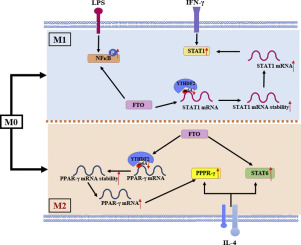当前位置:
X-MOL 学术
›
Cell. Signal.
›
论文详情
Our official English website, www.x-mol.net, welcomes your
feedback! (Note: you will need to create a separate account there.)
N6-methyladenosine demethylase FTO promotes M1 and M2 macrophage activation.
Cellular Signalling ( IF 4.4 ) Pub Date : 2020-02-01 , DOI: 10.1016/j.cellsig.2020.109553 Xiaofei Gu 1 , Yiwen Zhang 1 , Di Li 1 , Hongshi Cai 1 , Luhui Cai 1 , Qiong Xu 1
Cellular Signalling ( IF 4.4 ) Pub Date : 2020-02-01 , DOI: 10.1016/j.cellsig.2020.109553 Xiaofei Gu 1 , Yiwen Zhang 1 , Di Li 1 , Hongshi Cai 1 , Luhui Cai 1 , Qiong Xu 1
Affiliation

|
Macrophage polarization is the driving force of various inflammatory diseases, especially those involved in M1/M2 imbalance. N6-methyladenosine (m6A) is the most prevalent internal mRNA modification in eukaryotes that affects multiple biological processes, including those involved developmental arrest and immune response. However, the role of m6A in macrophage polarization remains unclear. This study found that FTO silencing significantly suppressed both M1 and M2 polarization. FTO depletion decreased the phosphorylation levels of IKKα/β, IκBα and p65 in the NF-κB signaling pathway. The expression of STAT1 was downregulated in M1-polarized macrophages while the expression of STAT6 and PPAR-γ decreased in M2 polarization after FTO knockdown. The actinomycin D experiments showed that FTO knockdown accelerated mRNA decay of STAT1 and PPAR-γ. Furthermore, the stability and expression of STAT1 and PPAR-γ mRNAs increased when the m6A reader YTHDF2 was silenced. In conclusion, our results suggest that FTO knockdown inhibits the NF-κB signaling pathway and reduces the mRNA stability of STAT1 and PPAR-γ via YTHDF2 involvement, thereby impeding macrophage activation. These findings indicated a previously unrecognized link between FTO and macrophage polarization and might open new avenues for research into the molecular mechanisms of macrophage polarization-related diseases.
中文翻译:

N6-甲基腺苷脱甲基酶FTO促进M1和M2巨噬细胞活化。
巨噬细胞极化是各种炎症性疾病的驱动力,尤其是那些与M1 / M2不平衡有关的疾病。N6-甲基腺苷(m6A)是真核生物中最普遍的内部mRNA修饰,它影响多种生物过程,包括那些涉及发育停滞和免疫应答的过程。但是,m6A在巨噬细胞极化中的作用仍不清楚。这项研究发现FTO沉默显着抑制了M1和M2极化。FTO消耗降低了NF-κB信号通路中IKKα/β,IκBα和p65的磷酸化水平。FTO敲低后,STAT1在M1极化巨噬细胞中的表达下调,而STAT6和PPAR-γ在M2极化中的表达下降。放线菌素D实验表明,FTO抑制可加速STAT1和PPAR-γ的mRNA衰减。此外,当沉默m6A阅读器YTHDF2时,STAT1和PPAR-γmRNA的稳定性和表达增加。总之,我们的研究结果表明FTO抑制可抑制NF-κB信号通路并通过YTHDF2参与而降低STAT1和PPAR-γ的mRNA稳定性,从而阻碍巨噬细胞的活化。这些发现表明FTO和巨噬细胞极化之间以前未被认识的联系,并可能为巨噬细胞极化相关疾病的分子机制研究开辟新的途径。
更新日期:2020-02-03
中文翻译:

N6-甲基腺苷脱甲基酶FTO促进M1和M2巨噬细胞活化。
巨噬细胞极化是各种炎症性疾病的驱动力,尤其是那些与M1 / M2不平衡有关的疾病。N6-甲基腺苷(m6A)是真核生物中最普遍的内部mRNA修饰,它影响多种生物过程,包括那些涉及发育停滞和免疫应答的过程。但是,m6A在巨噬细胞极化中的作用仍不清楚。这项研究发现FTO沉默显着抑制了M1和M2极化。FTO消耗降低了NF-κB信号通路中IKKα/β,IκBα和p65的磷酸化水平。FTO敲低后,STAT1在M1极化巨噬细胞中的表达下调,而STAT6和PPAR-γ在M2极化中的表达下降。放线菌素D实验表明,FTO抑制可加速STAT1和PPAR-γ的mRNA衰减。此外,当沉默m6A阅读器YTHDF2时,STAT1和PPAR-γmRNA的稳定性和表达增加。总之,我们的研究结果表明FTO抑制可抑制NF-κB信号通路并通过YTHDF2参与而降低STAT1和PPAR-γ的mRNA稳定性,从而阻碍巨噬细胞的活化。这些发现表明FTO和巨噬细胞极化之间以前未被认识的联系,并可能为巨噬细胞极化相关疾病的分子机制研究开辟新的途径。











































 京公网安备 11010802027423号
京公网安备 11010802027423号